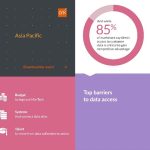
Ms Mah Kam Lin, Group Data Scientist at Maybank has weighed in on our recent article on the data breach in Malaysia…..
She adds, “Cash might be king, but data is the ultimate emperor. Time and again we preach integrity and maturity in handling data, but we are mostly undermined by many parties, especially the not so learned. When data workers restrict data access, some parties freak out and form biased opinions on how ‘selfish’ or ‘info stingy’ data workers are. Data has to be handled in a mature manner, especially personal data of customers. Unfortunately, not many data workers are aware of this, and not many institutions training and churning out data workers stress this in their academic syllabus.”
Previous article…..
Personal details of tens of millions of Malaysians obtained from a 2014 data breach have likely been available for sale for a long time, according to the founder of an online portal who revealed the massive data breach this week.
It was investigating an alleged attempt to sell the data of more than 46 million mobile phone subscribers online, in what appears to be one of the largest leaks of customer data in Asia.
Vijandren Ramadass, the founder of tech portal Lowyat.net, uncovered the data leak – which is likely to have affected almost every Malaysian and possibly millions of tourists – when a user tried to sell the data on the portal’s forum last month.
Further investigations led him to the dark web, where he found web links to download the data. He said the fact he was able to obtain all the data – valuable to fraudsters – for free suggested it had been around for a while.
“Somebody might have already made a lot of money from it, and somebody else decided to release it,” Ramadass told Reuters. “The longer the data it is out there, the more likely it is to be released for free.”
Ramadass said the data likely came from multiple sources as the datasets had different formats and fields. Time stamps indicate the leaked data was last updated between May and July 2014.
The leaked data, which cybersecurity experts have said was extensive enough to allow criminals to create fraudulent identities to make online purchases, included lists of mobile phone numbers, identification card numbers, home addresses, and SIM card data of 46.2 million customers. It also contained personal data from some medical associations and a jobs portal.
The country’s internet regulator, the Malaysian Communications and Multimedia Commission (MCMC), has said it is investigating the breach, along with the police, but there has been no official confirmation of the scale of the breach.
SOLD ONLINE
The material had been posted on several underground websites, including a Russian hacker forum, in mid-October, according to a Singapore-based cybersecurity researcher.
The Facebook page of a Malaysia-based internet marketing consultant had been offering data whose descriptions sounded similar to the hacked cache on Oct. 4. When the researcher contacted the person running the page, the posting was removed.
A cached version of the page showed it was offering 16 million records, including what it said were the databases of telephone companies, as well as other material that did not appear to match those in the reported leak.
Someone with the same contact details had also been attempting to sell a “database for business and marketing” on a local e-commerce website, Carousell, saying it included names, mobile numbers, addresses and identity card details by location, buildings and roads.
The ad had been uploaded on Oct. 16, and it was not clear if the data was the same as the reported breach.
Bryce Boland, chief technology officer for Asia Pacific at cybersecurity firm FireEye, said what was unusual about the Malaysian case was that the data sale went public.
“Most of the sales of this kind of data is pretty closed, only to members of trusted networks,” he said. “There’s a lot more data being sold on the underground beyond this particular disclosure.”
MALAYSIA’S RESPONSE
The Singapore-based researcher said he was not surprised that organizations and the government had been slow to publicly discuss the breach.
“In Southeast Asia reputation is always an issue,” the researcher said. “Every time there is a breach, they rarely elaborate on it.”
Lowyat’s Ramadass, who first reported on the data leak on Oct. 19, said he has been working closely with MCMC since then, providing the regulator with links to the sites that let users download the data, which had then been blocked.
“The public is still not aware of how serious it is. It’s really up to the telcos and MCMC to educate the public on how the data may be abused,” Ramadass said.
Malaysia’s biggest mobile service providers, including Maxis , Axiata Group’s Celcom and Digi, among others, have said they are cooperating with authorities, but have not made any comment on what steps customers who may have been affected should take.
MARKETING Magazine is not responsible for the content of external sites.









